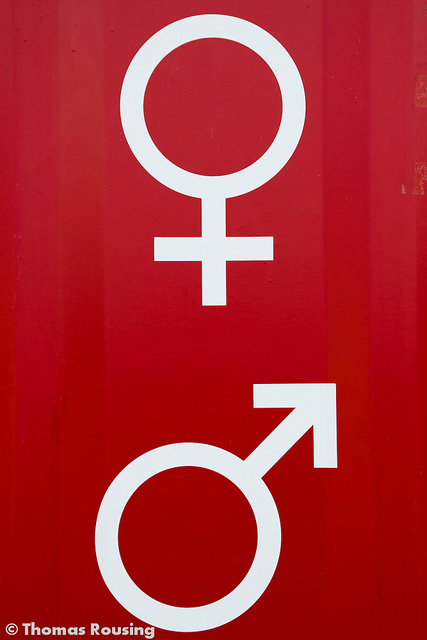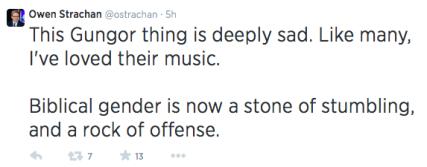An article on WORLD magazine’s website bemoans a Grammy-nominated Christian band’s “drift from biblical orthodoxy.” The substance of this move toward heresy?
- the band leader no longer believes in an historic Adam, Eve, or Noah
- the band’s newest album expresses doubt (for the record: so does the biblical book of Job) AND, most importantly and heretically:
- a new musical track experiments with feminine metaphors for God!
Russell Moore, president of the Southern Baptist Convention’s Ethics and Religious Liberty Commission, tweeted the WORLD article, saying “this is really sad.”
Owen Strachan, who teaches theology at Boyce College, which is affiliated with the Southern Baptist Convention, and who serves as president of the Council of Biblical Manhood and Womanhood, was more expressive, tweeting
The second part of that tweet is an allusion to 1 Peter 2:8…except that there it’s Jesus who’s the stumbling stone and the rock of offense — not Bronze Age-appropriate gendered expressions that the Bible, being a text of its context, employs, along with other notions that not even the strictest patriarchalist adheres to — such as the implication in the various laws that women are property (property that ought to be treated decently, but property nonetheless.)
I’m not sure why Bible’s female metaphors for God (some of my favorites are in Deut. 32 and in Isaiah) get almost no airtime and to suggest that we might think about God as Mother equals heresy. Sure, the language of masculinity is used to to talk about God more than the language of femininity, but it is there, albeit largely ignored in certain quarters.
Speaking for myself, when God’s “maleness” is upheld to the exclusion of God’s “femaleness,” I can’t help but feel…I’m not sure. Excluded? Left out? Less-than?
[Side note: while my husband and I discussed this at dinner, our eight year old piped up: “wait, someone is saying that God is a man!? But God’s not a man, a woman, a person, or an alien!” And then he went back to gnawing his pizza crust.]
On her first Sunday at our church, the new assistant priest beautifully incorporated the matriarchs into the liturgical prayer — invoking “The God of Abraham, Isaac, and Jacob, and of Sarah, Rebecca, Rachel, and Leah.”

Fe+Male. Image courtesy Thomas Rousing via Flickr Creative Commons.
It was as if I let out a huge breath I didn’t know I was holding in for a very, very long time. Named women in the liturgy; women of God, my God, not exclusively the God of men! I wrote the priest a note to thank her. “Strange that it is 2014 and hearing the matriarchs’ names along with the patriarchs’ names was such a revelation for me…” I said. But it was.
Beneath all this, I can’t help wondering: Surely God is not really so fragile as to need all this defending? “I AM WHO I AM,” God says to Moses. God gets to define who God is, and no one else does. If God is pleased to express God’s nature in female metaphors, as a birthing, nursing, comforting mother, who are we to object?
And isn’t it just a bit presumptuous to assert that any of us has the authority to dictate the best (or ONLY) words that may be used to express aspects of an inexpressible God? Do we not, to paraphrase Marilynne Robinson, mistake for reality itself the words we use to articulate what we can perceive?
No, “biblical gender” is not a stumbling block keeping people from the ‘true faith.’ But it may be a millstone that teachers of the law load people down with — and, being that many of these teachers are men, it’s a burden that they themselves do not carry.






